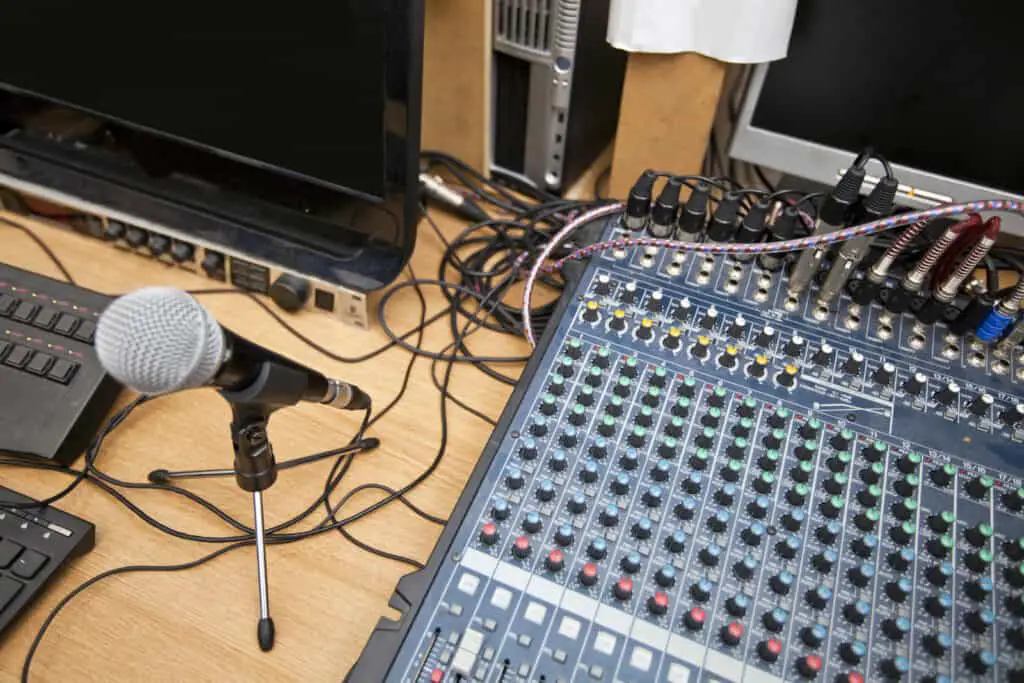Voice acting is a performing art that is as complex as traditional acting. This type of acting has to deliver the entire performance through vocal artistry alone, which requires honing many skills beyond dramatic range.
Voice actors are highly trained professionals who specialize in this art. Many of them are also traditional actors.
Being a voice actor can be challenging, but it can also be gratifying and entertaining. It requires proficiency not just in acting but also in vocal skills. Technical know-how is a must, and a home studio is usually necessary. Voice actors tend to freelance, and their craft is their business.
If you’re looking to find out more about what voice actors do and how it works, read on to discover what lies behind the performances.
Table of Contents
What Are Voice Actors?
Voice actors are performing artists who do voice-over and voice talent work in a variety of media. They use only their voices to convey characterization and emotion, and are known for their high technical and acting skills.
The art of voice acting can be traced back to 1900, when a Canadian inventor, Reginald Fessenden, recorded a weather report.
Since then, the market for voice talent has continued to evolve and accelerate in the last few decades. Commercial actors have lent their voice to notable projects numerous times, but many voice actors have made a career out of this art alone.
Today, voice actors can be found in anything, from video games to audiobook recordings, and their importance has become grounded in the entertainment industry and beyond it.
In the United Kingdom, voice acting is treated as a full-fledged dramatic profession. This has been influenced by the historical significance of voice actors who performed in radio plays.
The Daily Life of a Voice Actor
A voice actor’s daily routine usually revolves around auditions, demo recordings, and training. Many voice actors have to juggle family life with working from home and professional commitments while keeping their voices in peak shape and ready to go straight into the next available gig.
They will spend most of their working hours in either their home studio or, if working a job, at a studio determined by the client. Voice actors will usually have more than one gig at a time, requiring flexibility in routines and changing schedules.
Outside of ongoing jobs, voice actors will continue to have auditions or send demos to potential new clients.
The routine will depend entirely on the voice actor and their other commitments. Some will prefer to work a full shift in the morning and then spend their afternoons with family or on leisure activities. Others will prefer to break down their workday into segments, especially if they have ongoing jobs.
In terms of audition numbers, these will also vary depending on the market and on personal preferences. On average, most voice actors tend to do around ten auditions per working day if the numbers are available. Others like to dedicate an hour or two in their work time just to auditions.
When not working or spending time with family, voice actors can usually be found networking and working on their marketing, or on vocal exercises and further training to keep their skills sharp.
How to Get into Voice Acting
Getting into voice acting can seem like an easy switch to make if you already have a traditional acting background, but not all personalities and voices are suited to this career.
You will first need to establish whether this fully suits you, and then you will need to go through some specific training and follow the advice of experts in the field.
Education and Training
It’s not compulsory to have a long-standing acting background before embarking on a voice acting career, but some acting training will come in handy as a foundation.
If you don’t already have acting lessons under your belt, you should first get familiar with some basics, especially when it comes to techniques.
Acting techniques will serve you well when you start picking up voice acting gigs. A voice actor will stand out not only through their vocal and interpretation skill, but also through the speed with which they adapt to a role.
Following the study of acting basics, you should pursue classes in vocal training and coaching. Learning how to modulate your voice to use it as your sole performance tool can take some time, and as with acting, the study of techniques specific to this skill will make a huge difference.
Pursuing Gigs
Once you’ve made progress with your training, you will be able to start looking into job offers for voice acting. There are several things you should do at this stage:
- Invest in equipment: This can be expensive, but a voice actor will require high-quality products to deliver the best performances. You will not always get to go to professional studios to perform, so it’s best to establish a working home studio that you can work from at any given time.
- Create networks: Like with any type of acting, connections formed through networking will be essential for your portfolio. Attend events and conferences, and make yourself known and available. The next gig can come from anywhere.
- Record demos: When you apply to voice acting jobs, you will usually be asked to provide a sampling of your vocal skills. Make sure to have a few on hand, and of various types. You can spend more time creating demos for the category you’re most interested in being part of, but you should be ready for anything.
- Market your skills: Make sure to have your social media and website polished and ready to attract potential clients. You should promote your skills and market your business as much as possible to stand out in the industry.
The Three Types of Voice Acting
There are three main categories of voice acting that include many different subsets. Most voice acting jobs will fall under the following types, and they are by no means limiting. Voice actors making a career out of this will usually experience all three:
Commercial
Commercial gigs mainly involve voice-over narrations done for TV and radio. These can be ads, promos for events or shows, and infomercials. There can be acting opportunities when there is a role to play other than a neutral narrator. Still, voice talent will generally find a wealth of voice-over opportunities here rather than more intricate acting.
Character
One of the more intricate categories, this is where acting will shine most. Character gigs involve voice acting in video games as well as cartoons and other animated features.
Voice talent will get to fully immerse themselves into the characters they are playing, and the given structure is very similar to live acting.
There will usually be a script to follow, and a director to control the environment. The voice actor will get to put all their creativity and skill into the role and make it their own. Acting training will be entirely on display here, as well as the complexity of the vocal talent.
Dubbing
Dubbing is another mostly voice-over job that voice actors can find. This can be another profitable gig, especially for translation work in foreign countries. Dubbing requires acting techniques too, as the voice actor will have to replicate the tone and delivery of the original material into a different language, whether it’s movies, TV shows, or commercials.
Is Being a Voice Actor Fun?
Despite the obstacles that can be found along the way, voice acting can be highly entertaining. Voice actors will get to hone their performance skills in new and highly technical ways that can set them apart from their peers.
They will also get to experience the industry from an entirely different perspective while making their own niche in it.
Voice acting is also a hugely versatile type of acting, and actors will get to experience many types of work that will provide them with different benefits and opportunities.
Conclusion
Voice actors are highly skilled performers who tend to work on a freelance basis from home studios. Their professional lives revolve around continuous training and juggling various voice-acting gigs while auditioning for others.


![Kaotica Eyeball vs Fatboy: ALL You Need to Know [2023]](https://performerlife.com/wp-content/uploads/2022/05/Kaotica-fatboy-211x150.jpg)

![What Happened To “Chief Keef”? [Everything to Know About This Rapper]](https://performerlife.com/wp-content/uploads/2022/05/Chief-Keef-211x150.jpg)